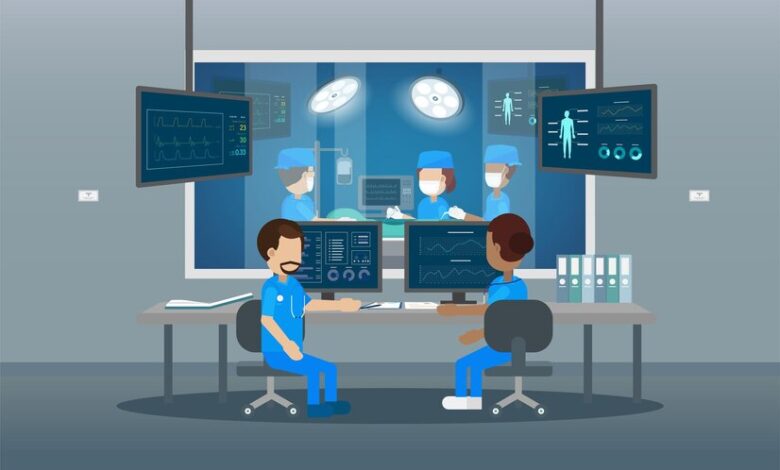IT Support in the Healthcare Industry: Navigating Unique Security Needs

In today’s healthcare industry, IT support has become crucial as organizations navigate the complex landscape of digital security. With the growing use of electronic health records (EHRs), telemedicine, and connected medical devices, healthcare institutions face unique challenges in safeguarding sensitive data and ensuring system reliability. Cybersecurity risks are particularly concerning in healthcare due to the potential for data breaches that compromise patient confidentiality and disrupt critical operations. We will explore how chicago it support teams address these distinct security needs, implementing strategies that balance patient privacy with the demands of modern healthcare services.
Understanding the Importance of Data Protection in Healthcare
One of the primary concerns for IT support in healthcare is data protection. Patient health information is highly sensitive, encompassing everything from medical histories to personal identifiers, and healthcare organizations are responsible for ensuring this information remains confidential. Data protection is not just a regulatory requirement under laws like the Health Insurance Portability and Accountability Act (HIPAA) but also a critical element of patient trust. When patients provide their personal and medical information to healthcare providers, they trust that it will be handled securely and ethically.
Healthcare data breaches can lead to severe consequences, including identity theft, financial losses, and harm to a healthcare provider’s reputation. With the rise in cyberattacks targeting the healthcare sector, IT support teams must implement robust security measures to protect against unauthorized access to patient data. This includes encryption of data in transit and at rest, as well as secure authentication protocols for accessing patient records. In addition, healthcare IT support staff must be vigilant about potential insider threats, as breaches can also result from employees misusing access privileges.
Data protection is further complicated by the interoperability of healthcare systems, which allows different organizations and devices to share patient information. While interoperability improves efficiency and continuity of care, it also creates additional vulnerabilities. IT support teams in healthcare must work to secure data across multiple systems and devices, ensuring that data sharing does not compromise patient privacy. Therefore, effective data protection in healthcare requires a multi-layered approach that combines technical safeguards with policies and procedures for handling sensitive information.
Securing Medical Devices and the Internet of Medical Things (IoMT)
In addition to protecting patient data, IT support in healthcare must address the security of medical devices, which have increasingly become connected to networks through the Internet of Medical Things (IoMT). The IoMT encompasses a range of devices, from wearable health monitors to sophisticated imaging systems, all of which generate valuable patient data. While IoMT enhances healthcare quality by providing real-time data for diagnosis and treatment, it also introduces new security challenges. Connected devices are potential entry points for cyberattacks, and if compromised, they can disrupt patient care or lead to unauthorized access to sensitive information.
IT support teams in healthcare must implement strategies to secure these devices from potential threats. One key approach is network segmentation, which involves isolating medical devices on separate networks to limit their exposure to cyber threats. By creating dedicated networks for medical devices, IT teams can control and monitor traffic more effectively, reducing the likelihood of unauthorized access. Additionally, regular software updates and patches are essential to address vulnerabilities in device firmware, as outdated software is a common target for attackers.
Another consideration for IT support is device authentication and access control. Not all healthcare staff need access to every device or system, and restricting access based on roles can prevent unauthorized individuals from tampering with or misusing medical equipment. When multiple healthcare providers need to access a device, IT support can implement multi-factor authentication (MFA) to verify identities and prevent unauthorized access. The importance of securing medical devices is amplified by the fact that many are life-supporting or life-saving, meaning that any disruption to their functionality can have serious consequences for patients.
As the healthcare industry increasingly relies on digital technologies, the role of IT support in ensuring security has grown more critical than ever. We have explored how IT support teams address unique challenges, from data protection to regulatory compliance and the security of connected medical devices. By implementing comprehensive security measures and preparing for potential incidents, IT support teams play an essential role in protecting patient data and maintaining the reliability of healthcare systems.
The unique security needs of healthcare require IT support teams to adopt a proactive and adaptable approach, balancing regulatory compliance with the demands of modern medical practices. By safeguarding patient information and ensuring the continuity of medical operations, IT support teams contribute to a healthcare environment that prioritizes security and patient trust. In an era where cyber threats are a constant concern, healthcare IT support is indispensable to the safe and effective delivery of healthcare services.





